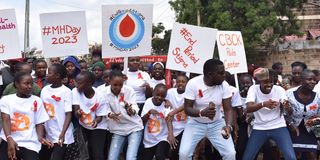We should normalise menstruation

Christian Best Camps of Kenya Pad Centre staff and other participants lead a procession in Nairobi to mark the World Menstrual Hygiene Day.
We must break the silence around periods, tackle the stigma associated with them and raise awareness of menstrual hygiene.
The lack of sanitary pads has made girls engage in transactional sex to acquire them.
From an early age, girls learn to live with pain and fear and seldom seek help when in physical or mental discomfort due to periods. The silence, exclusion, teasing and shaming affect their psychological and physical development and hinder their potential a lot.
The lack of access to basic hygiene facilities and awareness leads to increased school dropout rates among girls. The girls are then often pushed into premature marriage, leading to permanent loss of potential.
To help our girls to live freely and chase their dreams, we must end period shame and have open conversations about menstruation.
The essentials of menstrual health are safe, acceptable and reliable supplies to manage menstruation; privacy to change materials; facilities to safely and privately wash; and accurate information to make informed choices.
Comprehensive approaches that combine education with infrastructure and with products and efforts to tackle stigma are most successful for menstrual health.
Global and national health and development policies should prioritise menstrual health, with investment reflecting its important role in human rights, public health, gender equality and sustainable development. Schools, workplaces and public institutions should ensure that people can manage menstruation with comfort and dignity.
Targeted policies should eliminate period poverty, in which low-income women and girls struggle to afford menstrual products and have limited access to water and sanitation services.
Also, let the government give pads for free in schools. That not only makes it easier for girls to manage their periods and focus on classwork but also signals to young women that their needs matter and that periods are an important part of being healthy.
Ms Afandi is a journalism and communication student at Rongo University. [email protected].





